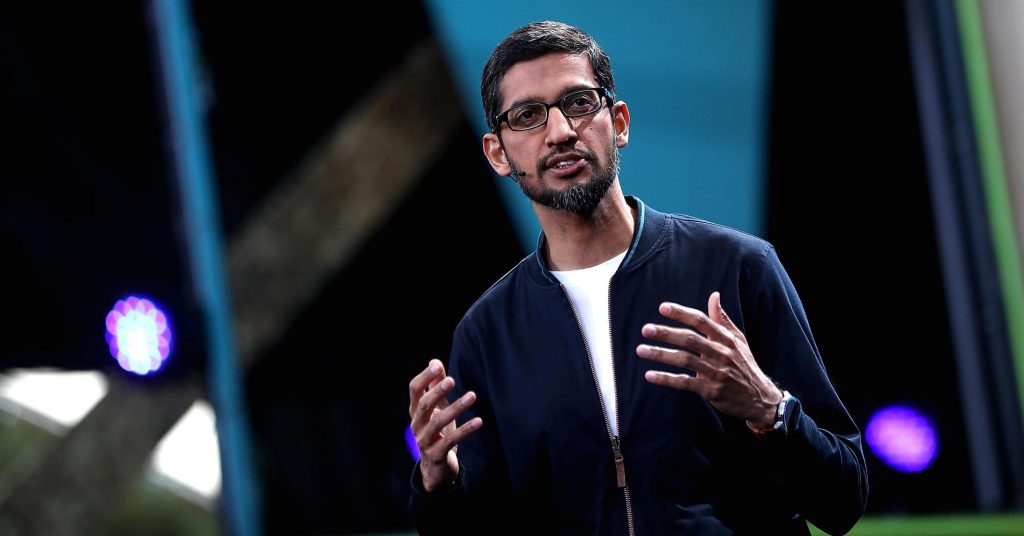|
Getting your Trinity Audio player ready...
|
Google CEO Sundar Pichai expressed enthusiasm for the potential of immersive computing experiences, citing Apple’s Vision Pro headset as an example. In a recent Q&A with Bloomberg, Pichai discussed various topics, including artificial intelligence (AI) and Google’s response to market challenges.
Pichai noted that while he hasn’t personally tried the $3,499 Vision Pro headset yet, he believes that computing will evolve beyond the confines of current smartphones. This statement reflects Google’s perspective on the future of technology and its commitment to innovation.
Addressing cost-cutting measures at Google, Pichai emphasized the company’s ongoing efforts to improve efficiency. In January, Google laid off 12,000 workers and scaled back business with external firms that employed contract workers. These actions were part of Google’s strategy to streamline operations and adapt to changing market conditions.
Regarding research publication, Pichai commented on OpenAI’s use of Google’s technology as a competitive threat. He stated that while Google may consider proprietary interests as products are developed, the company intends to continue actively publishing AI research.
When it comes to virtual reality (VR) and augmented reality (AR), Google has had mixed success. The company initially released a VR headset made from cardboard in 2014, followed by other VR headsets. However, Google has shifted its focus to AR experiences within its apps, such as Google Lens. Notably, Google Glass, its earlier attempt at AR glasses, faced criticism for its design and privacy concerns. Google recently announced the discontinuation of the product after concentrating on the enterprise market.
In a separate development, Meta CEO Mark Zuckerberg reportedly criticized Apple’s Vision Pro headset during a companywide meeting, deeming it too expensive and misaligned with Meta’s VR vision. Meta is a major player in the VR market with its Quest line of headsets.
Pichai was also asked about Microsoft CEO Satya Nadella’s remarks regarding Google’s agility in the face of AI developments. Pichai responded in a lighthearted manner, suggesting that Nadella’s comments were intended to prompt this very question during the interview.
The insights shared by Pichai shed light on Google’s perspectives and strategies in areas like immersive computing, research publication, and responses to market competition. As technology continues to advance, companies like Google are at the forefront of shaping the future of computing experiences, and their decisions have far-reaching implications for the industry.
Pichai’s comments on the potential of immersive computing experiences and Google’s ongoing efforts to enhance efficiency and innovation highlight the competitive nature of the tech industry. As companies like Google and Meta vie for dominance in the VR and AR markets, their differing approaches and visions underscore the diverse paths taken to shape the future of these technologies.
The discontinuation of Google Glass serves as a reminder that even tech giants can face setbacks in their pursuit of groundbreaking products. While Google’s foray into VR may not have achieved the desired success, the company’s shift towards AR experiences within its apps indicates a strategic pivot based on user needs and market trends.
The debate surrounding research publication in the field of AI also reflects the challenges companies face in balancing proprietary interests with the wider scientific community’s benefits. Google’s commitment to continuing active research publication demonstrates its belief in the importance of knowledge sharing and collaboration in advancing the field.
Furthermore, Pichai’s response to Nadella’s remarks suggests that industry leaders closely monitor each other’s moves and comments. The competitive landscape of the tech industry requires companies to constantly adapt and respond to emerging trends, technological advancements, and market dynamics.
As the boundaries of computing continue to evolve, immersive experiences, AI integration, and advancements in VR and AR will shape the way we interact with technology. The decisions and strategies pursued by industry leaders like Google will have significant implications for the future of the tech industry, influencing consumer experiences, market competition, and the overall direction of technological innovation.
The ongoing developments in immersive computing and AI technologies reflect the rapid pace of change within the industry. As consumers, we can anticipate exciting advancements in these areas that will redefine how we engage with digital experiences and shape our daily lives.
The tech industry’s ability to respond to user demands, navigate regulatory landscapes, and address concerns related to privacy and ethical implications will play a crucial role in shaping the future trajectory of immersive computing. The outcome of this dynamic landscape will not only affect industry players but also have a profound impact on society as a whole.
In this ever-evolving landscape, the competitive spirit between tech giants like Google and Meta will continue to drive innovation and push boundaries. It remains to be seen how their respective visions for immersive computing and AI will unfold and resonate with consumers, ultimately shaping the future of the industry and the way we interact with technology.
